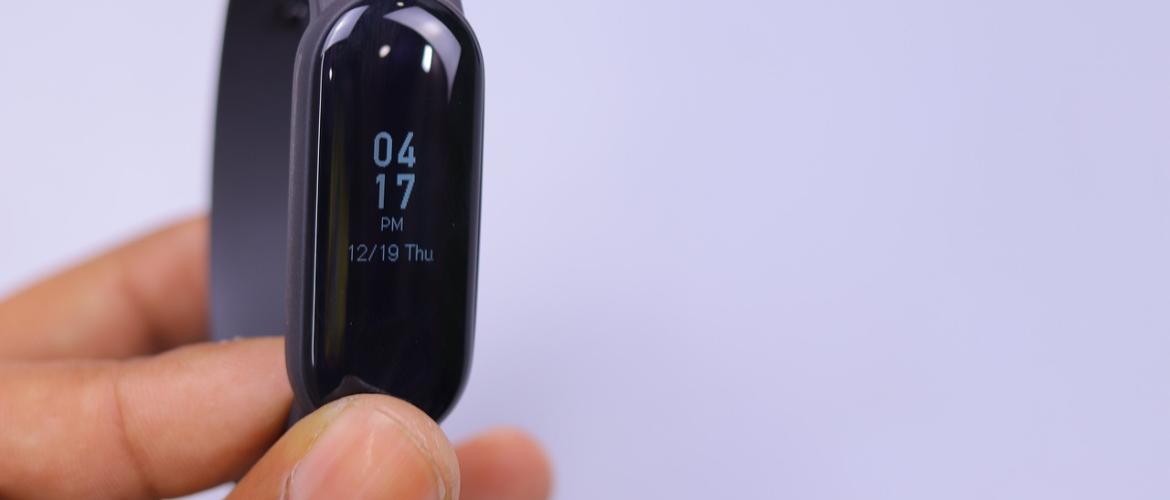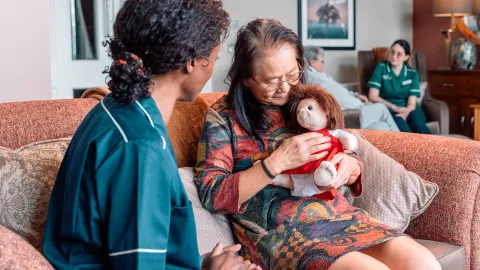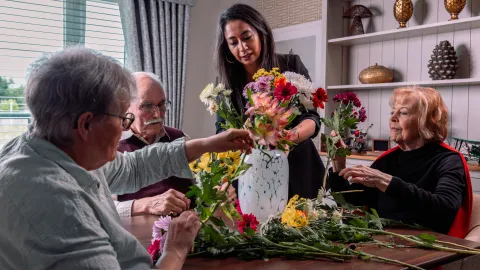
What is wearable technology for dementia care?
Wearable technology for dementia care is a type of assistive equipment developed to support people living with dementia on a day-to-day basis, helping them improve their quality of life and retain their independence for as long as possible. These include assistive mobile health applications and ioT wearable devices such as a wearable panic alarm, floor alarms, and tracking devices. Wearable technology for Alzheimer’s is an effective, non-invasive way to support patient diagnosis and monitoring.
How does wearable technology work for dementia care?
These technological solutions are great for improving the quality of life of people living with dementia, helping them maintain their independence and giving their caregivers or families peace of mind by ensuring the safety and wellbeing of their loved ones. According to the National Library of Medicine, dementia safety devices or wearable monitoring devices for the elderly are designed to be wearable, while another is used by the caregiver, which is an IoT platform application, that allows communication between the patient and the caregiver.
Thanks to their GPS technology, they help reduce the risks of wandering—a common concern for people with dementia (Liu et al., 2017), by providing real-time updates—alerts if they are leaving a designated area, and an updated location. Some wearable technologies for people living with dementia offer reminders for medications or appointments, promoting independence while reducing the load for caregivers.
Examples of wearable technology for people with dementia
Smart watches – often include GPS tracking, allowing caregivers to know where a person is. They can get alerts if they wander outside a designated area or are detected when the wearer falls. It can also provide continual monitoring of the person's state and has the capability of essential reminders such as when to take their medication and at what dose.
Wearable panic alarm – gives you freedom to live independently in your home. They are typically worn as a bracelet or clipped to clothing. With the touch of a button, you can discreetly alert emergency services or emergency contacts for help if you have an accident or feel distressed when alone. Loved ones can be alerted 24/7, offering peace of mind and reassurance.
Wearable tracking devices – can provide people with dementia with a higher level of independence and confidence. Loved ones can monitor their location in real-time and quickly locate them if they wander. It can also have the ability to measure sleep quality and detect abnormalities.
Floor mat alarms—These can be placed around rooms, allowing people to move freely. Caregivers can receive updates in real-time when their loved one is wandering and at risk of a fall, allowing immediate assistance. They are designed to help maintain independence while respecting their dignity.
How to choose the best wearable technology
When choosing the best device, consider what's most important for a person with dementia and their carer and if it suits their lifestyle. Opting for a device that balances autonomy, control, safety, and privacy is a good idea. Think about what you want your device to address – do you want it to monitor health or track location? Opting for a simple and easy-to-use device is key for dementia users, so make sure they have minimal buttons and clear interfaces. Making sure you can get real-life updates is best to get the most out of your wearable technology. You also want to look for dementia safety devices that fit comfortably and that the individual is happy with; it could be the case that an individual would prefer a device that can be clipped onto clothing rather than a dementia watch, so keep this in mind to avoid causing any frustration or confusion.
Unfortunately, wearable technology or IoT wearable devices present concerns about the lack of ethical consensus due to using trackers for people with dementia, so the decision must be made jointly by the person with dementia, their family, and their caregivers.
Where to find wearable technology for dementia care
We’ve provided a list of places where you can find wearable technology:
Promising future developments
There are many promising developments to watch. First and foremost, there is a shift away from IT-centralised systems to Artificial intelligence (AI)- powered smart activity sensors that distribute information and share it with a caregiver for effective preventative measures.
One potential solution is using trackers for people with dementia to assist with taking their medication. Some IoT wearable devices can alert them when it’s time to take their medication. However, in the future, these devices could also track whether they have taken their medication and provide reminders if they haven’t. Another potential solution is smart socks – these detect agitation and prevent falls in people with dementia.
VAT exemptions on wearable technology
Cost can be one of the barriers to embracing wearable technology for people living with dementia. VAT relief is available for those with a physical or mental impairment that has substantial, long-term effects on their everyday life. This is defined by the World Health Organisation as anything that lasts for more than three months.
Dementia fits firmly into this category, meaning VAT should be exempt in the majority of cases. Further financial support is often available from local councils, charities and organisations such as Independence at Home, Age UK and the Home Independence Agency.
Expert help & advice
Wearable technology can significantly improve the lives of people living with dementia. These dementia safety devices encourage users to make the right lifestyle changes, promoting overall well-being. The effectiveness of wearable technology depends on its accuracy. So, it's important to consult with healthcare professionals when deciding on what wearable technology is best.
Find more information on how to support people living with dementia in our Dementia Carers Support guide.


